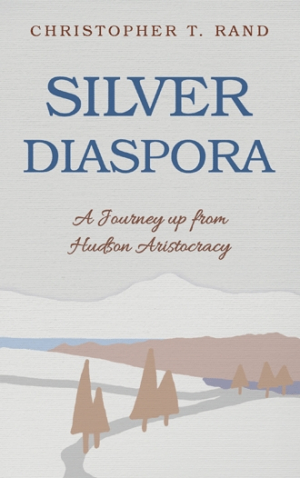Silver Diaspora
A Journey up from Hudson Aristocracy
A who’s who of Astor family, friends, and acquaintances, this book gives personality and life to iconic figures and fresh insight into well-known political scandals.
Raised amid the faded glory of the Gilded Age, author Christopher T. Rand shares his unique experiences and insights as a descendant of the great Astor empire, listed, in the antebellum years, alongside Vanderbilt and Rockefeller as the wealthiest in the nation. Silver Diaspora: A Journey up from Hudson Aristocracy meanders through decades of local and foreign politics, sports, music, cinema, and more, focusing on family dynamics and legend as the Astors interact and mingle with the wealthy, famous, notorious, and otherwise influential men and women of the times.
Temple, as his grandmother the grande dame Margaret Chanler Aldrich insists on calling him, has visited the Astors’ Rokeby Estate in New York regularly throughout his entire life. Despite his family’s move to California, his own pursuits at Groton and Berkeley, and many adventures in Asia, Africa, and the Middle East, Rokeby remains a prominent fixture in his life, representing the family’s evolving role in society.
Rand narrates Silver Diaspora through a series of historical and social anecdotes going as far back as 1685—when Robert Livingston, contributor to the Declaration of Independence and Rand’s ancestor, first settled in the Hudson River Valley—and continuing up until the present day. Each chapter loosely covers a period of time, although the book is likely to veer in many directions without warning or segue. Over the course of one page, Rand laments the quality his early childhood education, compares his experience learning multiplication tables to that of his daughter, mentions the Communist Revolution in China and the mysterious disappearance of his father’s colleague, and introduces Bis Lorentz, a contemporary of his mother’s at Vassar, who was “related to offspring” of Levi Strauss.
Rich in family history and brimming with names and relations, both close and distant, Silver Diaspora tends to skim over certain events not pertaining to the immediate topic, as when describing the circumstances of the birth of a fifth child, his sister Diana, long before any mention of the fourth. The addition of a family tree and photographs would assist in orientation. Other inconsistencies, in grammar and style, appear throughout: magazine titles are underlined, italicized, or treated to a combination; brother “Dicky” is also referred to as “Dickie”; and both the American “learned” and more British “learnt” are employed.
An index of names, places, and sources allows for quick reference although more thorough footnotes and/or a bibliography would be useful for further reading, clarification, and credibility. Several quotes and stories originate from family memoirs and journals while others, though entertaining, seem to be pure hearsay and speculation, like crediting great uncle Willie Chanler with discovering a “rum concoction” while on a “moderately lucrative business tour of Chile” and then introducing it to America as the daiquiri; or recounting as fact the tale of a childhood friend falling victim to an “AIDS Mary,” almost word for word mirroring the frightening urban legend prevalent in the 1990s.
These snippets fill Silver Diaspora with a sense of intimacy reminiscent of conversations whispered in the drawing room over after-dinner drinks. A literal who’s who of Astor family, friends, and acquaintances, this book gives personality and life to generations of iconic figures and fresh insight into well-known political scandals, both in America and the Middle East. Silver Diaspora, with its candid delivery, has multigenerational appeal and relevance.
Reviewed by
Pallas Gates McCorquodale
Disclosure: This article is not an endorsement, but a review. The publisher of this book provided free copies of the book and paid a small fee to have their book reviewed by a professional reviewer. Foreword Reviews and Clarion Reviews make no guarantee that the publisher will receive a positive review. Foreword Magazine, Inc. is disclosing this in accordance with the Federal Trade Commission’s 16 CFR, Part 255.

